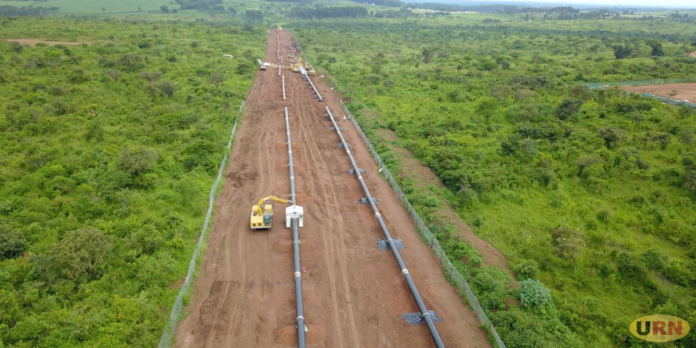By URN
Project-affected Persons (PAPs) under the East African Crude Oil Pipeline Project (EACOP) in Kikuube today protested, demanding the immediate halt of the entire project.
The 1,443km crude oil export pipeline will transport Uganda’s crude oil from Hoima in Uganda to the Chongoleani peninsula near Tanga port in Tanzania. More than 100 residents gathered near the Kikuube district headquarters, urging the government to suspend all EACOP activities.
Some of the EACOP PAPs carried placards with messages including: “No to land grabs,” “No to eviction,” “No to environmental harm,” “No to EACOP,” “Stop EACOP,” and “Chinese financial institutions should stop funding EACOP,” among others.
The PAPs are demanding that the EACOP project be stopped immediately to allow sufficient time for their grievances to be understood and meaningfully addressed.
They are also calling for an end to the alleged harassment and intimidation by project implementers.
The PAPs further demand an immediate stop to the arrest and harassment of grassroots environmental and human rights defenders advocating for the rights of affected communities.
They also demand the protection of natural parks and biodiversity, stressing that all oil activities in national parks and protected areas should cease to preserve biodiversity for future generations.
Barak Bakundane, one of the Project-affected Persons (PAPs), stated that the destruction of nature at this critical time—when the Albertine region and the country are transitioning into the production phase of oil and gas—should be condemned as criminal.
Innocent Tumwebaze, another PAP, explained that although the government acquired land for the project, people were not fairly compensated and urged the implementers to address the compensation issue first.
He emphasized that the project has negatively impacted the environment by encroaching on and degrading wetlands, swamps, and water sources, and by cutting down trees for the pipeline’s construction—without replacement.
He warned that the risk of oil spills and other environmental hazards poses a severe threat to ecosystems, endangering wildlife and communities who rely on the natural environment for their livelihoods.
Sarah Natukunda, another affected by the EACOP Project, explained that the compensation was inadequate. She stated that while the project may bring short-term economic benefits such as job creation and infrastructure development, these are often outweighed by the long-term environmental and social costs.
Racheal Tugume from Kijumba village in Kikuube noted that since the company began constructing the feeder pipeline, the area has experienced adverse climate changes due to the destruction of swamps, wetlands, water sources, and the cutting down of indigenous trees.
Last month, Hadi Watfa, the Manager of Above Ground Installation for the EACOP project, told Uganda Radio Network (URN) in an interview that the project is being executed with environmental sustainability in mind, addressing concerns raised by activists protesting its impact on the ecosystem.
Stella Amony, the Corporate Affairs Manager for EACOP, explained that 3,660 people have been affected by the project, with 95% of them fully compensated. The land acquisition process for the pipeline began in August 2018.
The pipeline route will traverse Uganda through Hoima, Kikuube, Kakumiro, Kyankwanzi, Mubende, Gomba, Sembabule, Lwengo, Kyotera, and Rakai, before crossing the border into Tanzania between Masaka and Bukoba, continuing through Kahama, Singida, Kondoa, and ending in Tanga.
Estimated to cost US$5 billion, the project’s starting point is at Nyamasoga village in Kabaale parish, Hoima district, Uganda.
A joint venture between China Petroleum Pipeline Engineering Co. Ltd and Worley Limited is undertaking the construction.
The pipeline will be 24 inches in diameter, insulated, and electrically heated, with six pump stations (two in Uganda), two pressure reduction stations, and a marine export terminal in Tanzania.
As of the latest update, contractors have laid about 80 kilometers of the pipeline across both Uganda and Tanzania.
The project is jointly owned by TotalEnergies E&P Uganda (62%), CNOOC Uganda (8%), Tanzania Petroleum Development Corporation (15%), and Uganda National Oil Company.
However, the EACOP project has faced significant opposition from local and international environmental and human rights activists.
In August this year, Project-affected Persons (PAPs) under the East African Crude Oil Pipeline Project (EACOP) in Hoima were blocked by the police from holding a peaceful demonstration throughout the city.
Numbering about 300, the protestors had planned to storm the offices of the Petroleum Authority of Uganda (PAU) in Hoima to demand a halt to the activities related to the construction of the heated crude oil pipeline.
They also planned to deliver a petition to TotalEnergies and EACOP.
In 2022, the European Parliament called for a one-year delay of the project, citing concerns over human rights violations and environmental damage. The Parliament’s resolution pointed to alleged abuses, including the wrongful imprisonment of human rights defenders, arbitrary suspension of NGOs, and forced evictions of landowners without proper compensation.
The EU Parliament also expressed concern about the potential displacement of more than 100,000 people due to the project.
Further, the Parliament raised alarms about the environmental impact, particularly on protected areas such as the shores of Lake Albert and Murchison Falls National Park, where TotalEnergies plans to dig 132 wells.
The resolution demanded that extractive activities in these sensitive ecosystems be halted.




